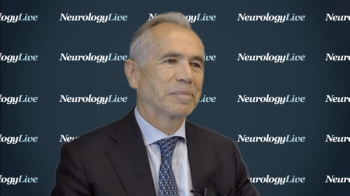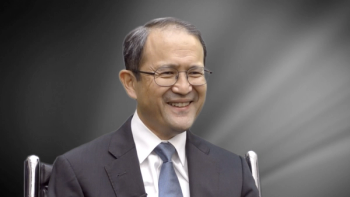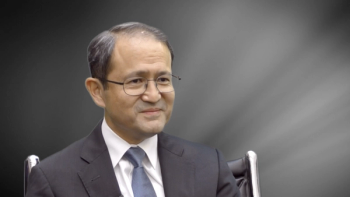
According to new data from STRIVE, 75.4% of those treated with natalizumab achieved overall No Evidence of Disease Activity status by year 4, and no patients had incidence of progressive multifocal leukoencephalopathy.

According to new data from STRIVE, 75.4% of those treated with natalizumab achieved overall No Evidence of Disease Activity status by year 4, and no patients had incidence of progressive multifocal leukoencephalopathy.

After showing significant benefits in delayed disease progression in patients with secondary progressive MS, new data suggests siponimod can delay the time to wheelchair dependence by 4 years.

Nearly 87% of patients enrolled in the phase 3b CASTING study had no evidence of disease activity following treatment with ocrelizumab after having an inadequate response to prior DMTs.

The global head of neuroimmunology at Genentech spoke about the wealth of data being presented on its anti-CD20 monoclonal antibody ocrelizumab, as well as the success thus far in trials of its NMOSD agent, satralizumab.

Study coauthor and professor of neurology and ophthalmology at the University of Colorado provides insight into phase 3 study results of satralizumab, presented at ECTRIMS 2019.

The professor of epidemiology and nutrition at Harvard TH Chan School of Public Health discussed what might be an optimal dose of vitamin D supplementation in MS, and how vitamin D deficiency should be addressed as a modifiable risk factor.

New phase 3 data from the OPTIMUM head-to-head trial show that 20-mg ponesimod resulted in a significantly lower annualized relapse rate in adults with multiple sclerosis compared to 14-mg teriflunomide at 108 weeks.

The humanized monoclonal antibody was particularly effective in patients who were seropositive for aquaporin-4 autoantibodies.

New decade-long data have suggested that multiple sclerosis treatment with dimethyl fumarate is associated with stable EDSS scores ≤3, and a low number of patients with confirmed disability progression.

New data from clinical trials of ocrelizumab showed that the anti-CD20+ B cell therapy lowered serum NfL levels, and that the NfL levels offered prognostic value for disease progression in MS.

Data from the phase 3 SUNBEAM trial of the sphingosine 1-phosphate receptor modulator have suggested that the Celgene treatment lowers annualized relapse rates and reduces the rate of cortical gray matter loss, improving cognition measures, compared to IFN-ß1a.

Novartis’ CD20+ B cell- targeting, fully-human antibody has outperformed teriflunomide (Aubagio) in a pair of phase 3 studies. The top-line data were presented at ECTRIMS 2019 in Stockholm, Sweden.

The principal medical science director at Genentech spoke about the decisions behind the tools being used for measurement, and what the neurologists can get from the data.

The medical director of the UCSF Multiple Sclerosis Center discussed the idea behind remyelination and shared his thoughts on what the best shot at developing a therapy might be.

The neurologist from Cleveland Clinic discussed the challenges of treating progressive MS, and shared his clinical experience with ibudilast.

For the director of the Johns Hopkins Multiple Sclerosis Center, a biomarker is perhaps only as useful as the clinician community’s ability to read out its measurements.

The director of the Comprehensive Multiple Sclerosis Center at Thomas Jefferson University discussed the concept of lymphocyte depletion to reset the immune system.

The smartphone application-led program, Floodlight Open, recently initiated in the US and Canada.

Results suggested that for every 1% of brain volume lost, a 51.7% increase in risk of clinically definite MS conversion was observed.

The goal of the free application is to make cognitive assessments routine in multiple sclerosis treatment.

The next important area of therapeutic development in MS appears to be in disease damage repair.

The monoclonal antibody has shown continued success up to 8 years in clinical trials.

One of the highly debated topics at ECTRIMS 2018 was the use of the investigational biomarker, neurofilament light, in the clinic.

The professor of neurology at Colorado University spoke about the ongoing phase IV trial to determine the safety of DMT discontinuation in MS.

This marks the first time a BTK inhibitor showed a clinical proof-of-concept in relapsing MS.

The Head of Global Clinical Development in Neurology at EMD Serono provided insight into the therapy's performance in phase IIb.

The director of Thomas Jefferson's Comprehensive Multiple Sclerosis Center spoke about the introduction of this treatment method into MS.

The staff neurologist at Cleveland Clinic’s Mellen Center for Multiple Sclerosis spoke about the current understanding of the biomarker.

The Global Head of Neuroimmunology at Genentech discussed the upcoming phase III trial of ocrelizumab while on-site at ECTRIMS 2018.

An updated safety analysis of the therapy in patients with relapsing MS, up to 10 years, has shown no new safety signals.